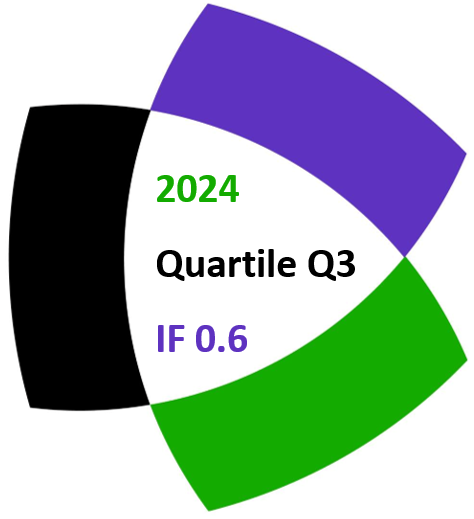Yasutsugu Fujita and Alain Togbé
Notes on Number Theory and Discrete Mathematics, ISSN 1310–5132
Volume 17, 2011, Number 4, Pages 42–49
Full paper (PDF, 194 Kb)
Details
Authors and affiliations
Yasutsugu Fujita ![]()
Department of Mathematics, College of Industrial Technology
Nihon University, 2-11-1 Shin-ei, Narashino, Chiba, Japan
Alain Togbé ![]()
Mathematics Department, Purdue University North Central
1401 S, U.S. 421, Westville, IN 46391, USA
Abstract
Let n be a nonzero integer. A set of m distinct positive integers is called a D(n)-m-tuple if the product of any two of them increased by n is a perfect square. Let k be an integer greater than two. In this paper, we show that if {k2 − 4, k2, 4k2 − 4, d} is a D(4k2)-quadruple, then d = 4k4 − 8k2.
Keywords
- Diophantine tuples
- Simultaneous Diophantine equations
AMS Classification
- 11D09
- 11J68
References
- Baker, A., H. Davenport, The equations 3x2 − 2 = y2 and 8x2 − 7 = z2. Quart. J. Math. Oxford Ser. Vol. 20, 1969, 129–137.
- Bennett, M. A. On the number of solutions of simultaneous Pell equations. J. Reine Angew. Math., Vol. 498, 1998, 173–199.
- Brown, E. Sets in which xy + k is a always a square. Math. Comp., Vol. 45, 1985, 613–620.
- Dujella, A. Generalization of a problem of Diophantus. Acta Arith., Vol. 65, 1993, 15–27.
- Dujella, A. On the exceptional set in the problem of Diophantus and Davenport. Applications of Fibonacci Numbers, Vol. 7, 1998, 69–76.
- Dujella, A. An absolute bound for the size of Diophantine m-tuples. J. Number Theory, Vol. 89, 2001, 126–150.
- Dujella, A. There are only finitely many Diophantine quintuples. J. Reine Angew. Math., Vol. 566, 2004, 183–214.
- Dujella, A., A. Filipin, C. Fuchs. Effective solution of the D(−1)-quadruple conjecture. Acta Arith., Vol. 128, 2007, 319–338.
- Dujella, A., A. Peth, A generalization of a theorem of Baker and Davenport. Quart. J. Math. Oxford Ser., Vol. 49, September 1998, No. 195, 291–306.
- Dujella, A., A. M. S. Ramasamy. Fibonacci numbers and sets with the property D(4). Bull. Belg. Math. Soc. Simon Stevin, Vol. 12, 2005, 401–412.
- Filipin, A. Extensions of some parametric families of D(16)-triples. Int. J. Math. Math. Sci., 2007, Article ID 63739, 12 pages.
- Filipin, A., B. He, A. Togbé, On the D(4)-triple {F2k, F2k+6, 4F2k+4}. Fibonacci Quart., Vol. 48, 2010, 219–227.
- Fujita, Y. The non-extensibility of D(4k)-triples {1, 4k(k − 1), 4k2 + 1} with |k| prime. Glas. Mat. Ser., Vol. III 41, 2006, 205–216.
- Fujita, Y. The extensibility of Diophantine pairs {k − 1, k + 1}. J. Number Theory, Vol. 128, 2008, 322–353.
- Fujita, Y. Extensions of the D(∓k2)-triples {k2, k2 ± 1; 4k2 ± 1}. Period. Math. Hungarica, Vol. 59, 2009, 81–98.
- Gupta, H., K. Singh, On k-triad sequences. Internat. J. Math. Math. Sci., Vol. 8, 1985, 799–804.
- He, B., A. Togbé. On a family of Diophantine triples {k, A2k+2A, (A+1)2k+2(A+1)} with two parameters. Acta Math. Hungar., Vol. 124, 2009, 99–113.
- Matveev, E. M. An explicit lower bound for a homogeneous rational linear form in logarithms of algebraic numbers. II. Izv. Math., Vol. 64, 2000, 1217–1269.
- Mohanty, S. P., A. M. S. Ramasamy, On Pr,k sequences. Fibonacci Quart., Vol. 23, 1985, 36–44.
- Mollin, R. A. Quadratics. CRC Press, 1996.
- Rickert, J. H. Simultaneous rational approximation and related Diophantine equations. Math. Proc. Cambridge Philos. Soc., Vol. 113, 1993, 461–472.
Related papers
Cite this paper
Fujita, Y., & Togbé, A. (2011). Uniqueness of the extension of the D(4k2)-triple {k2 – 4, k2, 4k2 – 4}. Notes on Number Theory and Discrete Mathematics, 17(4), 42-49.


